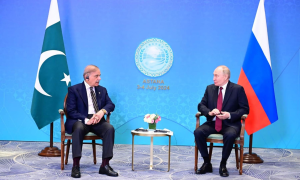Follow Bangladesh Model to Check Population Growth
Naveed Miraj
The country’s alarming population growth of 2.4 percent per annum, which translates to between four to five million children being added to the total each year, is no less than an existential threat.
It is unfortunate that there is no well-thought-out and cohesive population control program in the offing, and if the same neglect is meted out to this serious issue, the consequences could be dire for the country, which is already faced with immense challenges on the economic and security front.
Cultural and religious taboos surrounding the topic of family planning is one of the major barriers to controlling population growth. Talking to the Country Representative of the United Nations Population Fund (UNFPA), Dr Luay Shabaneh, the other day, President Arif Alvi very rightly called for bringing attitudinal change in society towards family planning to advance reproductive health and effectively managing the growing population in Pakistan.

Now the question arises as to how this change in attitude can be brought. Indeed, this will not come overnight, but a sustained effort will definitely deliver the results. We have before us the most successful model of Bangladesh, which used communications and awareness campaigns to change people’s attitudes to family size and to increase the use of contraceptives amongst married women.
As a result of this, according to World Bank data, the annual population growth of the country has declined from 2.77 percent in 1961 to 1.03 percent in 2020.
The success of Bangladesh’s population control strategy is reflected in the fact that the number of people using contraceptives has gone up from 8 percent in 1975 to about sixty-five to seventy percent now.

By pursuing this strategy, we can also achieve the same results; otherwise, as pointed out by President Arif Alvi, the rapid population growth is placing tremendous strain on national resources. Indeed, the fallouts of unchecked population growth would be food security, climate change, insufficient energy and resources and so on.
Governmental apathy and flawed population planning, misinterpretation of religion and unfounded customs, poverty and illiteracy, low contraception prevalence and birth control awareness, the custom of child marriage and preference for the son have only added to the problem.
Apart from putting greater emphasis on education, especially for girls, it has become important to launch a mass awareness campaign at the gross roots level using different platforms in order to educate the people about the benefits of a small family.
In this whole campaign, the role of religious scholars, media, and opinion leaders, as well as that of federal and provincial authorities, will be pivotal in bringing positive behavioral changes in society and advancing the agenda of family planning and better health in the country.

The way President Arif Alvi and First Lady Samina Alvi have contributed immensely in raising awareness about breast cancer and the rights of differently-abled persons, we expect them the same on this most pressing issue.
50% of pregnancies in Pakistan, out of 9 million, are unwanted due to the unmet need of its population for family planning products and services.
Therefore, any communication strategy must also be backed up with access to dependable family planning services through the public healthcare system, especially in rural and far-flung areas. The services of Lady Health Workers can prove to be beneficial for this purpose.
























